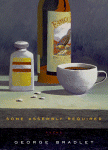|
|
 |
|
|
 |
 |
 |
 |
George Bradley was born in Roslyn, New York, and graduated from Yale University in 1975. He has been a construction worker, a sommelier, and an advertising copywriter. His first book of poems, Terms to Be Met, was chosen by James Merrill as the winning volume in the 1985 Yale Series of Younger Poets competition, and he has since published two other collections of poems, Of the Knowledge of Good and Evil (1991) and The Fire Fetched Down (1996). His work has appeared frequently in The Paris Review, and he is a frequent contributor to The New Yorker, The New Republic, and Poetry. Among the awards he has received are the Witter Bynner Prize from the American Academy and Institute of Arts and Letters, the Peter I. B. Lavan Award from the Academy of American Poets, and grants from the National Endowment for the Arts and the Ingram-Merrill Foundation. He lives in Chester, Connecticut.
Photo: Jennifer W. Lester
|
|
 |
 |
 |

|
George Bradley, whose previous work has drawn praise from James Merrill and Harold Bloom, here meditates on contemporary culture, on the natural world and the world imagined, and on the life of the poet. Whether he is standing in line at the SuperSave, where tabloids beckon, or contemplating the change of seasons in a classic sonnet sequence, Bradley juxtaposes the sublime workings of the mind with the mundane static that surrounds it. What he finds in this conjunction is a surprising beauty, a uniquely contemporary formal music, and, often, a curative dose of humor. Even verse itself is not exempt from his clarifying view, as he proves in “How I Got in the Business,” a wild ride through several sorts of commerce, including the poetry trade. Throughout Some Assembly Required, Bradley savors both the riveting accident of everyday life and the long view afforded by art, in poetry that is taut, witty, and dynamic.
|
|
 |
|
|
|



